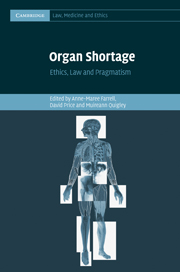Book contents
- Frontmatter
- Contents
- List of figures
- List of tables
- Contributors
- Acknowledgements
- List of abbreviations
- Table of cases
- Table of legislation
- Part I Setting the scene
- Part II Current issues affecting organ shortage
- Part III Strategies for addressing organ shortage
- Part IV Comparative perspectives
- Part V Current reform and future challenges
- 14 Negotiating change: organ donation in the United Kingdom
- 15 Addressing organ shortage in the European Union: getting the balance right
- 16 Promoting organ donation: challenges for the future
- Bibliography
- Index
16 - Promoting organ donation: challenges for the future
from Part V - Current reform and future challenges
Published online by Cambridge University Press: 29 March 2011
- Frontmatter
- Contents
- List of figures
- List of tables
- Contributors
- Acknowledgements
- List of abbreviations
- Table of cases
- Table of legislation
- Part I Setting the scene
- Part II Current issues affecting organ shortage
- Part III Strategies for addressing organ shortage
- Part IV Comparative perspectives
- Part V Current reform and future challenges
- 14 Negotiating change: organ donation in the United Kingdom
- 15 Addressing organ shortage in the European Union: getting the balance right
- 16 Promoting organ donation: challenges for the future
- Bibliography
- Index
Summary
Data from the Potential Donor Audit (PDA) of all deaths in intensive care units (ICUs) in the United Kingdom (UK) between 1 April 2006 and 31 March 2008 revealed a total of 30,276 audited deaths. In 3,184 patients brain stem death was a likely diagnosis, in 2,475 cases brain stem death tests were carried out and in a further 2,417 cases, death was diagnosed according to such tests (typically patients who suffered traumatic brain injury or intracranial haemorrhage). The possibility of organ donation was then considered in 2,266 cases, leading to the family being approached for permission for donation in 2,125 instances. Consent was given on 1,299 occasions and organ donation occurred in 1,186 cases. Thus, not only are just a small percentage of persons who die in ICUs potential (heart-beating) donors (slightly over 10 per cent), but only a relatively limited percentage of these potential donors become actual donors (the conversion rate) – approximately 49 per cent. A process of attrition begins from the moment that brain stem death becomes a possibility. Not only were 22 per cent of these patients not subjected to brain stem death testing at all, but in 12 per cent of instances the family was not approached for consent, nor did any discussion of organ donation take place. The picture presented above replicates that demonstrated by the earlier PDA in the UK between 1 April 2003 and 31 March 2006.
- Type
- Chapter
- Information
- Organ ShortageEthics, Law and Pragmatism, pp. 245 - 268Publisher: Cambridge University PressPrint publication year: 2011
- 2
- Cited by



